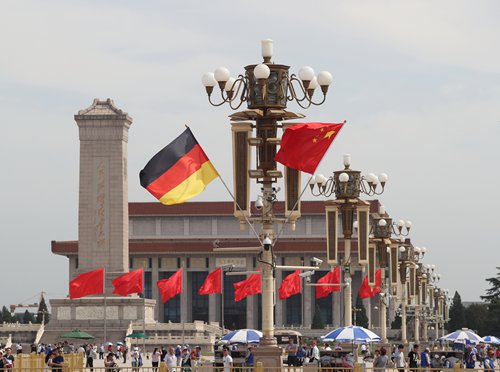HOME >> OPINION
Merkel's China visit will leave important legacy for future German leaders
Source:Global Times Published: 2019/9/5 11:28:40

Photo: IC
German Chancellor Angela Merkel will pay an official visit to China this Friday and Saturday, which marks her 12th trip to the country. Since Merkel took office in 2005, she attached importance to the relationship with China with her attitude toward China changing from frigid to pragmatic. Her overall policy toward China is positive, which has played a positive role in promoting China-Germany and China-Europe relations.
As China develops rapidly, some elements in Germany and in Europe have been concerned about the so-called China threat theory. They wish to strengthen ties with the US and the Western world to deal with the challenges from China, which they believe are in fields including economy, technology and geopolitics. Therefore, there is a growing voice in Europe and Germany on the adjustment of policies toward China.
As such, it is not an easy move for Merkel to insist on a friendly foreign policy toward China and endorse the big picture of bilateral cooperation with China. The two countries have found common ground not only in cooperation in economy, trade, technology and culture, but also in defending a multilateral world and existing rules of global governance. Keeping China-Germany ties on track is also conducive for China and Europe to smoothly develop their relationship.
Since US President Donald Trump was sworn in, he has broken many international agreements, using unilateralism to pressure Europe. Germany disagrees with many of US practices. In such context, Beijing-Berlin ties, the stance of Merkel, and her cooperation with Beijing in global governance are significant in safeguarding multilateralism, and the world trade system, as well as international order and rules.
Trade is Germany's foundation. Germany is the world's fourth-largest economy, and Europe's biggest, with the world's largest current account surplus for the third year running in 2018. So, German leadership always attaches most importance to gaining favor for the country's enterprises. Almost every time a German chancellor visits China, there is a large business delegation. This time is no exception.
Affected by disputes between Europe and the US, as well as by the US-launched trade war with China, Germany is facing an economic downturn. Therefore, economic policy will be a weighty part of Merkel's visit to China. A large business delegation is not surprising, and it will help create better conditions for the two countries to cooperate under the shadow of Trump's unilateralism.
Merkel's visit to China is significant for Germany. But as Europe has increasing doubts about China, Merkel has to bear a lot of pressure by insisting on her stance. However, objectively, her visit will also set a good example for other European countries, clarifying that China-proposed ideas - such as the Belt and Road Initiative, a community of shared future for mankind, and win-win cooperation - do not challenge Europe's position in the world, contrary to some Western media outlets' smear, and that confronting China is not a correct or good choice for Europe.
Some Western media outlets have intentionally anticipated that Merkel would discuss Hong Kong affairs with Chinese leadership. She expressed her opinion in Berlin on August 14 saying, "everything must be done to prevent violence and to find possibilities for a solution within the framework of dialogue," according to a Deutsche Welle report. Merkel is a wise leader, and she knows her visit to China is about cooperation.
It is almost a regular move for Western leaders to mention human rights issues during their trip to China. Merkel will probably mention Hong Kong, but she will only do so to shift pressure from within Germany. What the Chinese side needs to do is clearly state its stance that internal affairs of China should not be interfered with by external powers. And that's it.
Merkel won't seek reelection. So, her policy toward China could be a political legacy for her successors. When Merkel first came to power, she didn't agree with the friendly policy of her predecessor Gerhard Schroder toward China. But she then realized through practicality the importance of China-Germany cooperation. Merkel's change in attitude toward China was due to the realization that benign relations benefit Germany, Europe and the world. Her experience is an important legacy for future German leaders who excessively value ideology, are pro-US, or have biased knowledge of China.
The article was compiled by Global Times reporter Xu Hailin based on an interview with Sun Keqin, a research fellow at the China Institutes of Contemporary International Relations. opinion@globaltimes.com.cn
RELATED ARTICLES:
Posted in: VIEWPOINT